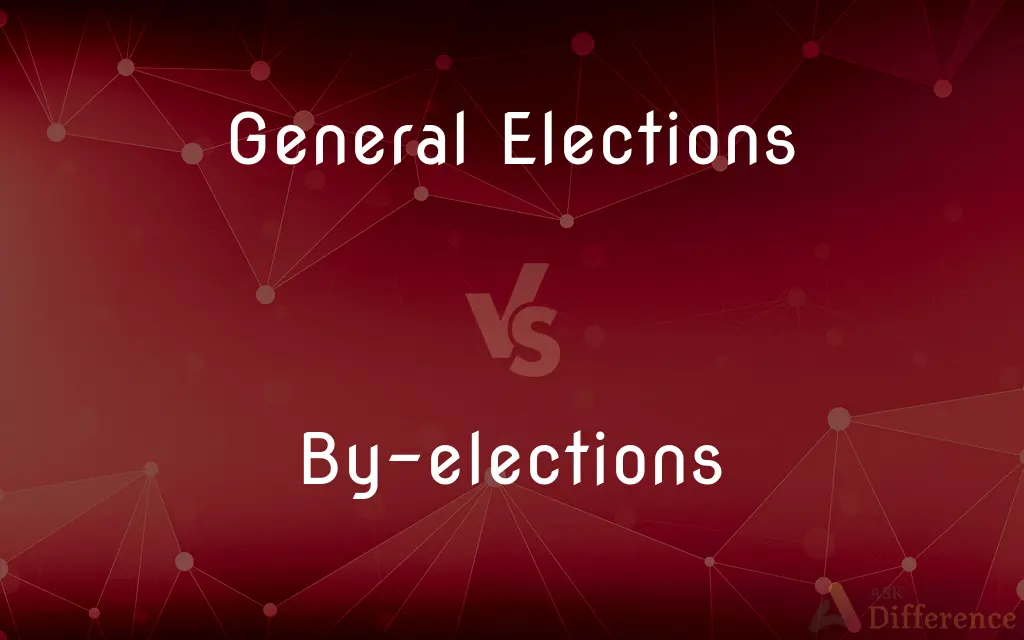General Elections vs. By-elections — What's the Difference?
By Tayyaba Rehman — Published on October 23, 2023
General Elections are regular elections where voters choose representatives for an entire legislative body. By-elections are held when a specific seat becomes vacant between General Elections, typically due to resignation or death.

Difference Between General Elections and By-elections
Table of Contents
ADVERTISEMENT
Key Differences
General Elections are a democratic process where voters elect their representatives for a complete legislative body, such as a national parliament or a state assembly. They occur at regular, predetermined intervals, often stipulated by a country's constitution or laws. By-elections, in contrast, are elections to fill individual vacancies that arise in a legislative body between General Elections. These vacancies might occur for various reasons, such as the resignation, death, or disqualification of a sitting member.
The scope of General Elections is broad, encompassing an entire region, state, or nation, depending on the legislative body in question. Every eligible voter within the defined territory can participate in General Elections. Conversely, By-elections are more localized events, limited to the specific constituency or district where the vacancy has arisen. Only voters within that particular region get to cast their ballots in By-elections.
General Elections set the broader direction for a country or region as they determine the ruling party or coalition and consequently the formation of a government. They reflect the larger public sentiment at a particular point in time. By-elections, while important, might not significantly shift the balance of power in a legislative body. However, they can be indicative of the current political mood, especially if the results diverge from the outcomes of the previous General Elections.
In terms of campaigning, General Elections usually witness larger campaigns, more media coverage, and increased political activity. Every party competes to secure a maximum number of seats. In contrast, By-elections might see concentrated efforts from political parties, but on a smaller scale, targeting the specific constituency in focus. While General Elections can redefine the political landscape, By-elections usually provide short-term political dynamics and insights.
Comparison Chart
Purpose
Elect representatives for entire legislative body
Fill individual vacancies between General Elections
ADVERTISEMENT
Occurrence
Predetermined intervals
When a specific seat becomes vacant
Scope
Entire region, state, or nation
Specific constituency or district
Voter Participation
All eligible voters in the area
Voters only in the affected region
Impact on Legislative Balance
Can change the majority party/coalition
Might not significantly alter the balance of power
Compare with Definitions
General Elections
Regularly occurring elections covering all constituencies of a legislative entity.
The opposition party is hoping to make significant gains in the next General Elections.
By-elections
Unscheduled elections triggered by events like resignation, death, or disqualification of a member.
The unexpected By-elections have seen an intense campaign from both major parties.
General Elections
Pre-scheduled elections where all seats in a legislative body are up for election.
Many young candidates are contesting in the upcoming General Elections, bringing fresh perspectives to politics.
By-elections
Short-term elections addressing individual vacancies rather than an entire legislative body.
By-elections often see concentrated political efforts tailored to the specific region's issues.
General Elections
Broad-scope elections determining the ruling party or coalition in a region or nation.
The outcome of the General Elections will shape the country's policies for the next few years.
By-elections
Elections held to fill a vacancy arising in a legislative body between regular elections.
The recent resignation of the senator has prompted a By-election in his constituency.
General Elections
Elections where the complete electorate votes for their preferred candidates for an entire assembly.
The new voting reforms are set to be tested in the upcoming General Elections.
By-elections
Localized elections limited to a specific constituency where a legislative seat has become vacant.
The ruling party's performance in the upcoming By-elections will be indicative of its popularity.
General Elections
Regular elections held to choose representatives for an entire legislative body.
The General Elections are expected to see a high voter turnout this year due to the intense campaigns.
By-elections
Polls conducted outside the regular election cycle due to unforeseen vacancies in a legislative assembly.
The sudden passing of the assembly member has necessitated By-elections in the district.
By-elections
A special election held between general elections to fill a vacancy, as for a parliamentary seat.
By-elections
Plural of by-election
Common Curiosities
What triggers a By-election?
By-elections can be triggered by events like the resignation, death, or disqualification of a sitting member.
What's the significance of General Elections?
General Elections set the broader direction for a country or region, determining the ruling party or coalition.
Why are By-elections conducted?
By-elections are held to fill individual vacancies in a legislative body that arise between General Elections.
How do By-elections affect political dynamics?
By-elections provide insights into short-term political dynamics and can indicate current political sentiments.
What are General Elections?
General Elections are regular elections where voters elect representatives for an entire legislative body.
Which has a broader scope, General Elections or By-elections?
General Elections have a broader scope, encompassing an entire region, state, or nation, whereas By-elections are localized to a specific constituency.
Which witnesses more intense campaigns, General Elections or By-elections?
General Elections usually witness larger campaigns and more media coverage, while By-elections have concentrated efforts on a smaller scale.
How often do General Elections occur?
General Elections occur at regular, predetermined intervals, often stipulated by a country's constitution or laws.
Can By-elections change the majority party in a legislative body?
While By-elections fill vacancies, they might not always significantly shift the balance of power.
Can there be multiple By-elections in a year?
Yes, if multiple vacancies arise in different regions or at different times, there can be multiple By-elections in a year.
Can all citizens vote in By-elections?
Only citizens residing in the specific constituency or region with the vacancy can vote in By-elections.
How do parties prepare differently for General Elections and By-elections?
For General Elections, parties prepare broader campaigns and manifestos for the entire region or nation, while for By-elections, they focus on local issues of the specific constituency.
How are seats distributed in General Elections?
In General Elections, all seats of the legislative body are up for election.
Are the results of By-elections binding?
Yes, the results of By-elections are binding, and the elected individual serves for the remaining term of the vacated seat.
Can a person contest in both General Elections and By-elections?
Yes, an individual can contest in both General Elections and By-elections, provided they meet the eligibility criteria for each.
Share Your Discovery

Previous Comparison
Formal vs. Semi Formal
Next Comparison
Budding Yeast vs. Fission YeastAuthor Spotlight
Written by
Tayyaba RehmanTayyaba Rehman is a distinguished writer, currently serving as a primary contributor to askdifference.com. As a researcher in semantics and etymology, Tayyaba's passion for the complexity of languages and their distinctions has found a perfect home on the platform. Tayyaba delves into the intricacies of language, distinguishing between commonly confused words and phrases, thereby providing clarity for readers worldwide.












































